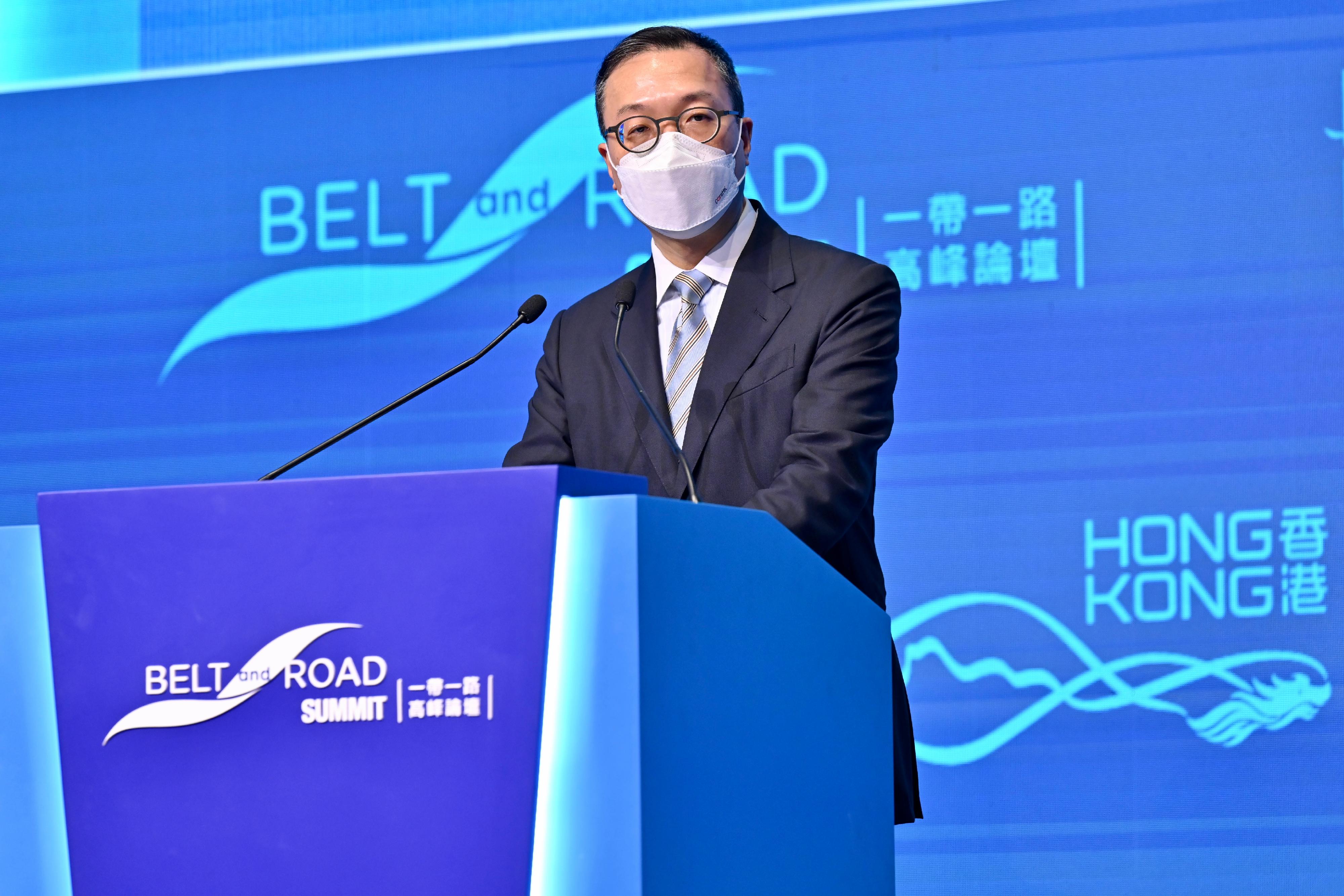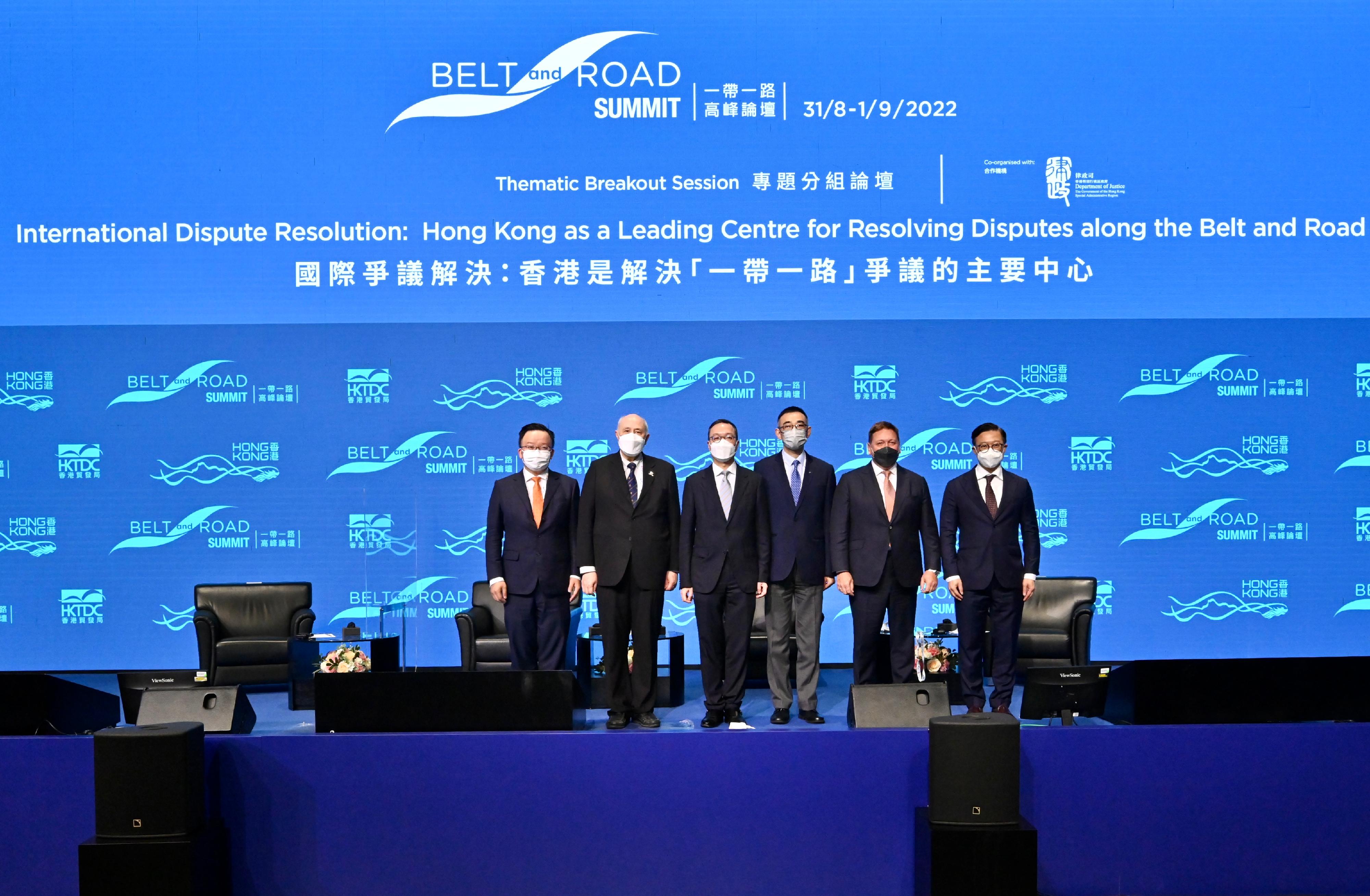Following is the welcome remarks by the Secretary for Justice, Mr Paul Lam, SC, at the thematic breakout session titled "International Dispute Resolution: Hong Kong as a leading centre for resolving disputes along the Belt and Road" of the Belt and Road Summit today (August 31):
Distinguished guests, ladies and gentlemen,
It gives me great pleasure to join all of you at this annual summit in celebration of the fruitful achievements in the Belt and Road Initiative (BRI) over the past nine years. With the gradual easing of global challenges from the pandemic, now is the time to explore new opportunities and deepen co-operation through the BRI, which is the largest platform for international co-operation.
From 2013 to 2021, the annual trade volume between China and countries along the Belt and Road expanded 73 per cent from US$1.04 trillion to US$1.8 trillion, and new infrastructure contracts valued at US$1.08 trillion were entered during the same period. In respect of any trade or investment contract, there is always a possibility that disputes may arise. It would be prudent at the outset to give some serious considerations on how and where any such dispute may be resolved.
On this occasion, I would like to share my views on how the full-fledged legal and dispute resolution services in Hong Kong can provide strong support for investors and the dispute resolution sectors in navigating new opportunities along the Belt and Road.
Hong Kong flourishes under "one country, two systems"
With its strategic geographical location in the Asia-Pacific region, Hong Kong is well placed to connect with the rest of the world, and Hong Kong is indeed the main gateway to Mainland China. As emphasised by President Xi at the meeting celebrating the 25th anniversary of Hong Kong's return to the motherland on July 1, 2022, the Central People's Government (CPG) fully supports Hong Kong in its effort to seize historic opportunities offered by China's development and actively dovetail itself with the 14th Five-Year Plan and other national strategies such as the development of the Guangdong-Hong Kong-Macao Greater Bay Area and, of course, the BRI. In his address, President Xi underscored that the CPG fully supports Hong Kong in maintaining the common law system, being one of its distinctive advantages. More importantly, he confirmed that the principle of "one country, two systems" must be adhered to in the long run. This means that our legal system including its independent judiciary, as well as law and practice familiar to the international commercial community, shall and will continue, thereby dispelling any previous doubt about the future of Hong Kong.
In the past 25 years, nine arrangements on mutual legal assistance in civil and commercial matters have been signed between the Mainland and Hong Kong. Three arrangements are arbitration-related to facilitate reciprocal recognition and mutual enforcement of arbitral awards and interim measures for protection of property, evidence and conduct preservation. The latest addition is the Arrangement on Reciprocal Recognition and Enforcement of Judgments in Civil and Commercial Matters, which will soon be implemented. It aims to provide a comprehensive mechanism for reciprocal recognition and enforcement of judgments between the Mainland and Hong Kong which covers around 90 per cent of cross-boundary civil and commercial cases. These arrangements enable people doing business in and with the Mainland to enjoy the legal protection offered by the Hong Kong legal system.
International collaboration in dispute resolution
With the staunch support from the CPG, we welcomed the establishment of the Asian-African Legal Consultative Organization (AALCO) Hong Kong Regional Arbitration Centre (AALCO HK Centre) as our new Legal Hub tenant in May this year. Together with five other regional arbitration centres of AALCO, the AALCO HK Centre stands out by offering cutting-edge online dispute resolution services for the Asian-African region. As of 2022, 46 African countries have signed memorandums of understanding to be part of the BRI. Through fostering the development and promotion of international commercial arbitration in the Asian-African region, the AALCO HK Centre further strengthens Hong Kong's unique role in building closer global connection with our African counterparts.
Innovation in dispute resolution
The pandemic has changed the way we work. While I believe everyone is pleased that physical events are gradually returning, the convenience of using legal technology, or lawtech in short, has found its way to stay by providing more efficient and cost-effective ways to resolve disputes, which in turn further enhances access to justice. One of the initiatives supported by the Government is the Hong Kong Legal Cloud, which offers secured, quick and affordable storage of and access to files and information for the legal and dispute resolution profession.
The reach of lawtech extends beyond the local community. In April 2020, Hong Kong has opted into the APEC Collaborative Framework for Online Dispute Resolution of Cross-Border Business-to-Business Disputes (APEC ODR Framework), which encourages the use of online negotiation, mediation and arbitration by micro, small and medium enterprises in resolving business-to-business disputes. Our home-grown institution, eBRAM Centre, has launched the APEC Online Dispute Resolution procedural rules tailor-made for the APEC Collaborative Framework last year and has been listed in April 2022 as the first and only ODR service provider from Hong Kong under the APEC ODR Framework to serve the APEC economies.
Funding options for arbitration in Hong Kong
Driven by growing market demand for flexible funding options for arbitration, and to facilitate meritorious claims and promote access to justice, the Government has been bringing forth supportive measures to facilitate arbitration users. In 2019, we have amended the Arbitration Ordinance (Cap. 609) to make it clear that third party funding of arbitration is permissible in Hong Kong. This year, we have introduced outcome related fee structures for arbitration (ORFSA) to provide sophisticated clients and commercial entities with additional funding options through diversified fee structures for arbitration.
With ORFSA, clients and lawyers may enter into fee arrangements that best suit their financial and risk management needs. This enables Hong Kong to compete on an even playing field with other major arbitral seats where similar fee arrangements are allowed. The ORFSA (Amendment) Ordinance 2022 lays the legal framework for ORFSA, particularly by providing that certain ORFSA agreements are not prohibited by the common law doctrines of maintenance and champerty. Subsidiary legislation will be enacted to set out the more detailed regulatory framework and the particular safeguards to further protect the interests of arbitration users. We aim to fully implement the ORFSA regime by the end of this year.
In respect of mediation, we work towards developing Hong Kong into an international investment law and investor-state dispute resolution skills training base by building up a team of investment mediators in Asia. This also complements the Mediation Mechanism for Investment Disputes established under the CEPA Investment Agreement between Mainland and Hong Kong, which encourages the use of Hong Kong's mediation services by Mainland investors to resolve cross-boundary investment disputes.
Conclusion
At the meeting of the Advisory Council of the Belt and Road Forum for International Cooperation last December, State Councillor Wang Yi said that "the BRI has never been a geopolitical strategy, but a road of development that helps to deliver the 2030 Agenda for Sustainable Development and drives shared progress and prosperity". As we move gradually to post-pandemic days amidst global economic headwinds, the BRI has become truly a path of hope bolstering resilience and optimism for what lies ahead.
With the steadfast support from the CPG, together with its unique strengths including a robust legal system and fine common law tradition, Hong Kong, as part of China – the largest market in the world – stands out from its global competitors. Hong Kong is committed to improving its legal regime continuously to better serve the international community, as well as offering users a buffet of dispute resolution options catering to the diversified needs of different clients from around the world. Whatever you need, you will find it here in Hong Kong. I hope that this Summit will reassure you that Hong Kong will continue to flourish and remain as the prime platform for businesses and practitioners to seize the golden opportunities that lie ahead along the Belt and Road.
Thank you very much.
Follow this news feed: East Asia







